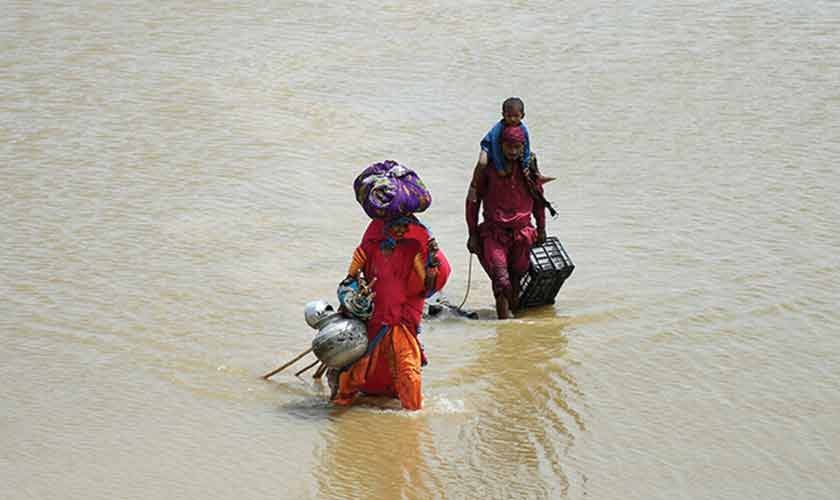The monsoon of 2022 brought torrential rains across Pakistan. Although the Meteorological Department had warned about possible flooding, sooner than expected, it turned into reality. Many areas of the country were submerged under water. Sindh was no exception.
At that time, I had just assumed charge as dean of the Faculty of Medicine at my university. The vice chancellor called an emergency meeting to discuss how to contribute to relief efforts for the communities in flood-affected areas. Teams comprising doctors and paramedics were being sent to provide first aid, food, medicines, and treatment for medical conditions expected in such disasters, such as skin and eye infections.
As a mental health professional, I could foresee that physical healthcare alone would not be enough. Acute panic and deep psychological scars are often part of such disasters. So, after a brief training on psychological first aid, I sent some medical officers, psychiatry trainees, and psychology interns to join our medical teams.
This team worked effectively on-site, but many patients were later referred to hospitals in Hyderabad for ongoing treatment. I had the chance to meet many of these individuals. Among them was an old, lean man I will never forget. He was quiet, and tears streamed down his blank face. He seemed unable to express the many thoughts and emotions crossing his mind. He was struggling to find words.
A companion informed me that during the flood, the man had lost the dowry he had saved for his daughter’s marriage. Without uttering a single word, his grieving face and eyes spoke volumes about his dreams that had been washed away and his broken spirit.
I also recall a mother who screamed every time she remembered her child drowning, and a farmer who lost his cattle—his livelihood wiped out. Behind every individual case, there was a story of human pain and sheer helplessness. The floods had not only dismantled houses and damaged crops but also swept away the hopes and peace of countless helpless people.
The problem did not end there. In a few weeks’ time, the people who had brought these patients and helped them settle down experienced anxiety, sleep disturbances, and trauma themselves. Thus, during and after the flood, my team and I had an unforgettable experience managing the various dimensions of grief.
Many survivors experienced shock in the beginning. They felt numb and were unable to grasp what had happened. Those who had helped others feared intensely losing loved ones, their belongings, hunger, disease, and another disaster. There was overwhelming grief for those who had lost family, relatives, homes, and lifelong savings.
As people tried to rebuild their lives amidst instability and insecurity, we found some struggling with panic, anxiety, and sleeplessness. Some developed post-traumatic stress disorder (PTSD), reliving traumatic events through flashbacks and nightmares. Others had suicidal thoughts due to survivor guilt.
Imagine a white-collar worker, once living with dignity, now standing in a queue for food—his pride shattered and his spirit broken. Children, accompanying families of psychiatric patients, displayed withdrawn and fearful behavior, often reflecting anxiety and confusion about their surroundings. Adults expressed irritability, helplessness, and emotional numbness. The elderly, already sick and fragile, lost their sense of safety and belonging.
Deep psychological scars linger long after the apparent damage is repaired. Recognizing and treating emotional wounds is as vital as treating physical conditions people face during disasters. Recovery goes beyond rebuilding homes and providing food and shelter; it means restoring the resilience, dignity, self-esteem, and hope of those who suffered.
If psychological wounds are not addressed, healing remains incomplete. Fear, grief, despair, and damaged ego prevent a person from fully recovering despite adequate physical healthcare. Emotional scars erode motivation, disturb sleep patterns, and weaken the body’s resilience.
This reality often pains me, as public attention and the media tend to focus more on physical health and infrastructure than on mental well-being. This flood left us wondering: can we not learn the lesson and train ourselves to practically help those in distress?
Rather than merely watching as bystanders, making videos, or shouting in panic, we can act with empathy by listening, connecting, and comforting those who have suffered—offering them a ray of hope.
Can our governments not support these distressed people in a dignified way that protects their self-esteem rather than hurting it, enabling them to become more resilient and capable of rebuilding their own lives—and maybe even helping others in turn?
https://www.thenews.com.pk/tns/detail/1350034-floods-washed-away-all-but-tears
